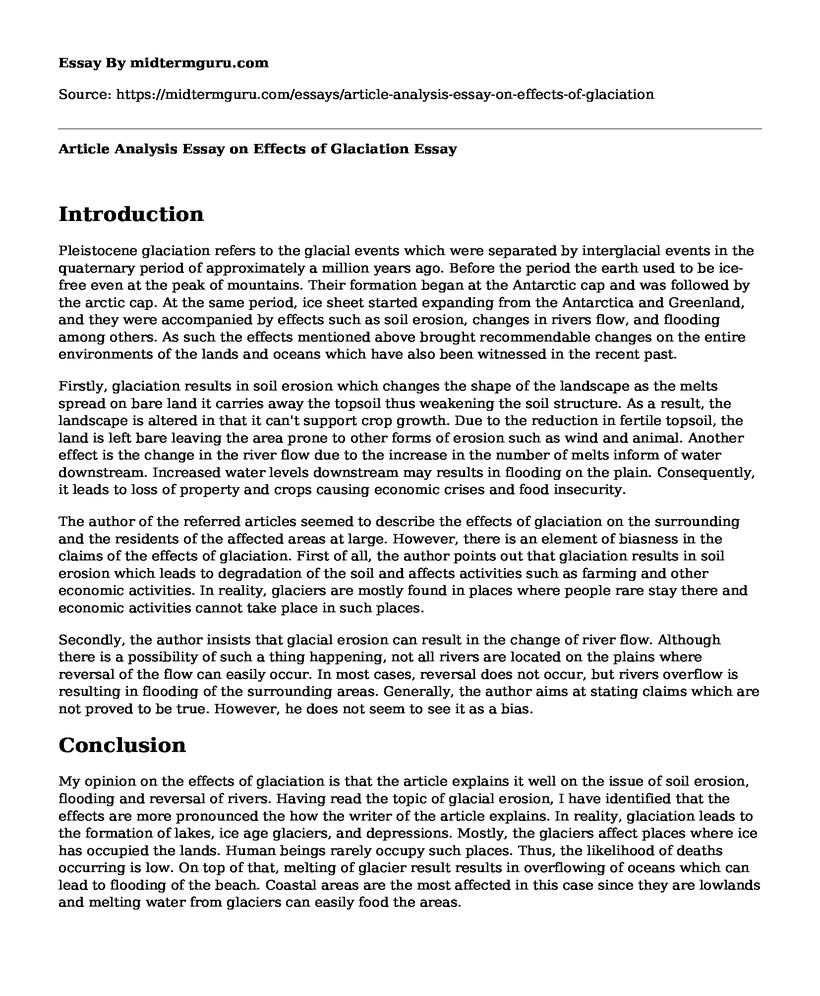Introduction
Pleistocene glaciation refers to the glacial events which were separated by interglacial events in the quaternary period of approximately a million years ago. Before the period the earth used to be ice-free even at the peak of mountains. Their formation began at the Antarctic cap and was followed by the arctic cap. At the same period, ice sheet started expanding from the Antarctica and Greenland, and they were accompanied by effects such as soil erosion, changes in rivers flow, and flooding among others. As such the effects mentioned above brought recommendable changes on the entire environments of the lands and oceans which have also been witnessed in the recent past.
Firstly, glaciation results in soil erosion which changes the shape of the landscape as the melts spread on bare land it carries away the topsoil thus weakening the soil structure. As a result, the landscape is altered in that it can't support crop growth. Due to the reduction in fertile topsoil, the land is left bare leaving the area prone to other forms of erosion such as wind and animal. Another effect is the change in the river flow due to the increase in the number of melts inform of water downstream. Increased water levels downstream may results in flooding on the plain. Consequently, it leads to loss of property and crops causing economic crises and food insecurity.
The author of the referred articles seemed to describe the effects of glaciation on the surrounding and the residents of the affected areas at large. However, there is an element of biasness in the claims of the effects of glaciation. First of all, the author points out that glaciation results in soil erosion which leads to degradation of the soil and affects activities such as farming and other economic activities. In reality, glaciers are mostly found in places where people rare stay there and economic activities cannot take place in such places.
Secondly, the author insists that glacial erosion can result in the change of river flow. Although there is a possibility of such a thing happening, not all rivers are located on the plains where reversal of the flow can easily occur. In most cases, reversal does not occur, but rivers overflow is resulting in flooding of the surrounding areas. Generally, the author aims at stating claims which are not proved to be true. However, he does not seem to see it as a bias.
Conclusion
My opinion on the effects of glaciation is that the article explains it well on the issue of soil erosion, flooding and reversal of rivers. Having read the topic of glacial erosion, I have identified that the effects are more pronounced the how the writer of the article explains. In reality, glaciation leads to the formation of lakes, ice age glaciers, and depressions. Mostly, the glaciers affect places where ice has occupied the lands. Human beings rarely occupy such places. Thus, the likelihood of deaths occurring is low. On top of that, melting of glacier result results in overflowing of oceans which can lead to flooding of the beach. Coastal areas are the most affected in this case since they are lowlands and melting water from glaciers can easily food the areas.
Works Cited
Palma, R. Eduardo, et al. "Glaciation effects on the phylogeographic structure of Oligoryzomys longicaudatus (Rodentia: Sigmodontinae) in the Southern Andes." PLoS One 7.3 (2012): e32206.
Cite this page
Article Analysis Essay on Effects of Glaciation. (2022, Aug 18). Retrieved from https://midtermguru.com/essays/article-analysis-essay-on-effects-of-glaciation
If you are the original author of this essay and no longer wish to have it published on the midtermguru.com website, please click below to request its removal:
- Reducing Carbon Footprint in Transport - Essay Sample
- Essay on Concern for Environmental Justice
- African Animals on Endangered Species List - Paper Example
- Consequence Management - Paper Example
- Essay on Danger of Non-Renewable Fuel to Climate Change
- Paper Example on History of US Jails
- Driverless Cars: A Solution to Global Warming? - Essay Sample







